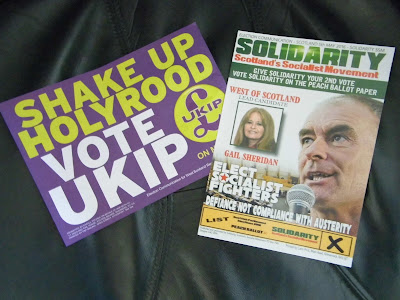You know, I had
intended to write about the SNP leaflet.
But that was before a couple of leaflets arrived that I hadn’t noticed
before leaving to enjoy the delights of our National Health Service. Without any irony, those leaflets come from
Solidarity and from UKIP.
Yip, I know, UKIP
standing for Holyrood. Just doesn’t make
any sense. Even more so given the
somewhat ‘tired and emotional’ interviews their sole elected representative in
Scotland, the MEP David Coburn, has made. Just to underline this, the UKIP
leaflet falls into the category of ‘general points and vague policy
aspirations’. In the vague policy
aspirations column, you can put the pledges to “Put job creation and the economy
first”, to “Open Technical & Grammar Schools” (even though the Grammar
School tradition disappeared here in the 60’s and 70’s) and to “Look after
veterans”.
Of course if this
is an election, UKIP has to mention the EU even though there is a referendum on
the horizon. If I’m honest, I’m kinda
perplexed as to why they have mentioned the EU here. After all their brand of euroscepticism is a
million miles away from the mild euroscepticism Scots have. Immigration is certainly not the key driver
for any form of Scottish euroscepticism, so for UKIP to deliberately conflate
immigration and freedom of movement again makes no sense.
UKIP’s slogan on
their leaflet is “Shake Up Holyrood”, yet the only party to have shaken up
either Holyrood or the Mound was the SSP.
Their formally charismatic leader, Tommy Sheridan now heads a party
called Solidarity. Their leaflet falls
into the category of ‘bullet point policies’.
With a long ‘Dave Spart-esque’ spiel about how #bothvotesSNP won’t work
and asking… no, begging the ‘Yes
community’ to give Solidarity their second vote. If memory serves, there might be one small
problem with that.
Throughout 2014,
stories emerged that members of the Women For Independence group were refusing
to share a stage with Tommy Sheridan. I
think Natalie McGarry was the first to flag this up, but there were
others. Certainly the treatment given to
Rosie Kane, Caroline Leckie & to Frances Curran by Sheridan in the
aftermath of his, er, outing, explains the hostility towards Sheridan. The book Downfall sets out the distinctly non
Sheridan point of view of the events that led to the implosion of the SSP
during the winter of 2004/5, and really shows how much of an issue Sheridan’s
sexuality and his misogynistic attitude became.
While you would like to view parties as dispassionately as possible, it
is only really team Sheridan that doesn’t view him and his vehicle as damaged
goods – whether you’ve read Downfall or not.
With that in
mind, his spiel can be seen as a cynical attempt to beg for votes from the so
called ‘Yes Community’. Even more so
given his attempt to appear ‘women friendly’ involves Mrs Sheridan being the
list candidate here. You can see that
with Sheridan’s policy positions, especially the pledge to scrap Trident and
for Indyref 2 in 2018. Ah, that
touchstone of pro-Independence supporters…
and showing a lack of patience that certainly would harm the
Independence movement. Given Sheridan’s outlandishly
blatant wooing of SNP voters, you’d have thought that he would have modulated
his criticism of the SNP’s new policy to retain & tinker with the Council
Tax when he pledged to “Replace Tory
Council tax with fairer Scottish Service Tax”.
There is also two
vague policy pledges on the leaflet. Of
course they are “Against Austerity” but there is no detail as to how they would
balance the books or ensure that public services are adequately paid for. The second one is the interesting policy to
“Create public pharmaceutical company”.
I assume this is to ensure best value for the NHS and that Sheridan
isn’t nuts enough to want to nationalise Glaxo Smith-Kleine.
For two parties
that are seeking, in different ways to shake up the current Holyrood landscape,
their leaflets (and indeed their whole campaign) have been utterly devoid of
that missing factor of having something interesting to say. UKIP’s campaign clearly is focused on June’s
referendum, to such an extent that there is no attempt to understand the
Scottish sensibility. This does not
however explain their poor performances on the stump and in interviews. For Solidarity, they have the same issues
regarding an inability to understand the Scottish sensibility – a sensibility
which sees the cabal that leads Solidarity as damaged goods and something of a national
joke. Rather than shake up Holyrood,
both UKIP and Solidarity have been as flat as two day old opened juice and have
been as equally appealing.

No comments:
Post a Comment